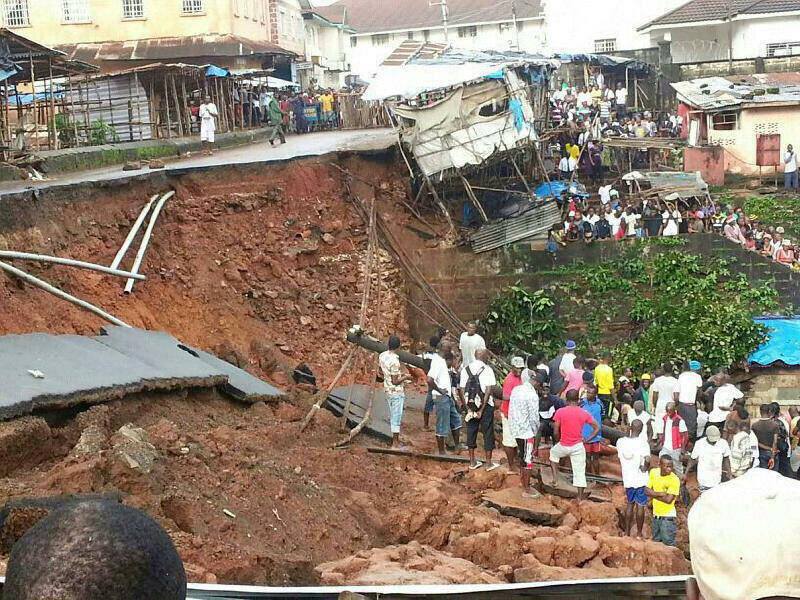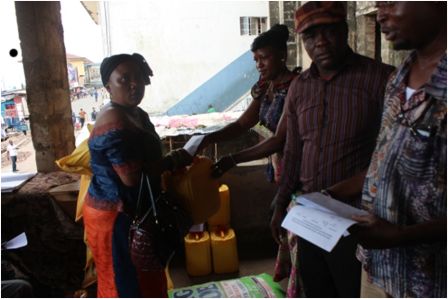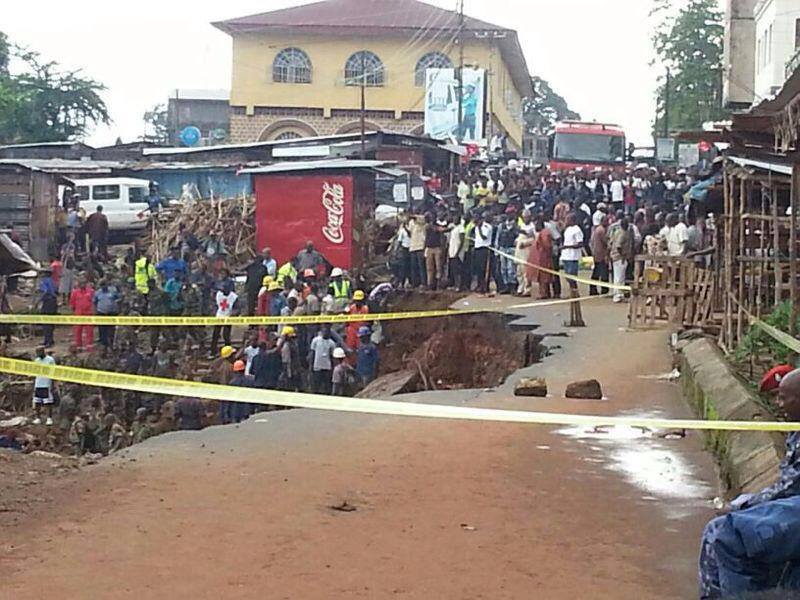Probing the King Jimmy debacle with a Human Rights lens
They marched in great numbers. Among them an old woman, who by guesstimate, is over 70 years. They had one common goal. They wanted to have a first-hand view of the damage done to the King Jimmy Bridge and the subsequent loss of lives owing to the heavy down on that day Muslims were thanking God for completing another Holy Month of Ramadan. After attending church service on the Sunday after the incident, I also joined the group of people visiting the scene. I was in the company of a woman who was also visiting the scene. I overheard her telling the driver of the taxi that “I am going to the Guard Street Market in the East of Freetown, but I just want to see the damage done to the King Jimmy Bridge, after which I will walk the long distance to the Guard Street market.” Shockingly, when I got to the scene on that day, I saw hundreds of Sierra Leoneans converging at the site. Yes, it was King Jimmy; one of the country’s monuments that occupies an appreciable number of pages in history books. At the scene, I asked, is it the case that King Jimmy attracted more tourists, but for the wrong reasons?
Unfortunately, tourism is defined as travelling for recreational, leisure, or business purposes. Ideally, tourists would have wanted to go to King Jimmy to see the richness of its antiquated relics. But the people who went to the scene wanted to see the destruction that claimed the lives of their compatriots. I will not go into what had been said by other analysts and commentators. But I will quickly point to what Munda Rogers, Director General of the Sierra Leone Roads Authority (SLRA) told the Parliamentary Oversight Committee on Works, Housing and Infrastructure. Mr. Rogers said among other things that he wanted to clarify that there was no bridge at King Jimmy. When did Mr. Rogers know that there was no bridge at King Jimmy? When did he know that “the colonial people only banked the place with mud” and “there is nothing there other than red stones?” If he had known, did he as SLRA boss warn or advise about the danger of such construction of a major road used by hundreds of vehicles and pedestrians on a daily basis? Mr. Rogers should know that his statement has promoted more questions than answers. In the meantime, anyway one looks at this unfortunate incident, it is a case of somebody/institution that failed to perform a duty of care owed to the people of Sierra Leone. But as promised, I will speak to the critical issues of human rights emerging out of the collapse of what Munda Rogers said was and is not a bridge at King Jimmy. They are the rights to life, housing and employment.
Sierra Leone is a signatory to a number of international and regional human rights instruments. But I dare say that the country has not fully lived up to its expectation in terms of the full implementation of the rights contained in many international human rights instruments including the International Covenant on Economic, Social and Cultural Rights (UNESCR). The rights which the government appears to be fulfilling are mostly civil and political rights contained in the International Covenant on Civil and Political Rights (ICSCR). The situation at King Jimmy is one of the pointers to the lack of implementation and/or enforcement of economic, social and cultural rights. The proponents of human rights have long observed and argued that human rights are indivisible. This is why “On the same day that it adopted the Universal Declaration, the General Assembly requested the Commission on Human Rights to prepare, as a matter of priority, a draft covenant on human rights and draft measures of implementation. …In 1950, the General Assembly declared that “the enjoyment of civic and political freedoms and of economic, social and cultural rights are interconnected and interdependent” (resolution 421 (V), sect. E).’’ The UNESCR in its preamble notes that “Recognizing that, in accordance with the Universal Declaration of Human Rights, the ideal of free human beings enjoying freedom from fear and want can only be achieved if conditions are created whereby everyone may enjoy his economic, social and cultural rights, as well as his civil and political rights…”
On housing and decent condition of living, Article 11 of the UNESCR provides that “The States Parties to the present Covenant recognize the right of everyone to an adequate standard of living for himself and his family, including adequate food, clothing and housing, and to the continuous improvement of living conditions. The States Parties will take appropriate steps to ensure the realization of this right, recognizing to this effect the essential importance of international co-operation based on free consent.” On employment, Article 6 (1) of the same document provides that the “States Parties to the present Covenant recognize the right to work, which includes the right of everyone to the opportunity to gain his living by work which he freely chooses or accepts, and will take appropriate steps to safeguard this right.” Of course, the protection of the right to life as provided for in Article 3 of the Universal Declaration of Human Rights (UDHR), Article 6 (1) of the ICCPR and Section 15 (a) and 16 (1) of the Constitution of Sierra Leone, Act No. 6 of 1991, among others, must be guaranteed for individuals to enjoy all other rights. The flipside of the coin is that the full implementation of the rights to employment and housing is a major contributing factor to individuals enjoying their right to life.
On housing, the UNESCR asks States to take appropriate steps to ensure the realization of this right. For God sake, what would strong men and women be doing under the King Jimmy ‘bridge’ and other bridges and markets if their economic, social and cultural rights like better housing facilities were catered for? Don’t tell me they are citizens engage in ‘anti-social activities’. If you think they are, then I submit to you that the State has also contributed to the state they find themselves. It is a question of the government’s failure to provide their needs in one instance, and/or in another its failure to remove people from places they are not supposed to inhabit. On the State taking appropriate action to ensure the realization of the right to housing, are we not seeing what a State institution like the National Social Security and Insurance Trust (NASSIT) is doing? NASSIT chose to work with its ‘partner’ to construct houses that 100 poor and impoverished Sierra Leoneans cannot buy even if they keep their monthly salaries for 50 years. Is that a sensible and appropriate step towards providing houses for Sierra Leoneans? At a time the country should be moving towards affordable houses, NASSIT decided to use the money of the many poor people to construct luxurious and incredible houses to be utlised by some of the very greedy, corrupt and wicked people.
Like the case of the beggars in my last article, the case of our compatriots who live under the ‘bridge’ and market stalls at King Jimmy is symptomatic of others who do the same in Freetown and other big cities. Returning from one of my official trips to the provinces around 4 a.m., I came across an unbelievable sight. I saw dozens of children and youth sleeping in front of shops along Sani Abacha, Wilberforce, Ecowas and Rawdon Streets to name but a few. They add to those who sleep in all markets and under almost all bridges in Freetown. Are they not Sierra Leoneans? If you think they have ulterior motives for being on the streets, then that is an issue for the law enforcement agencies. But are these not the same people our politicians go to during campaigns to ask them to vote for them and in some instances use them as ‘thugs’ to unleash terrors on others?
What about youth employment? This is another area the State has not treated with the seriousness it deserves. The country has got more institutions claiming to be working on youth related issues than the practicality and reality of what they are doing. They have done many studies than required. Take for example the fact that the country has a Ministry of Youth, a National Youth Commission and a Presidential Youth Adviser. Who is doing what, is a research question for students writing dissertations on youth related issues. At a time the National Youth Commission was commemorating the International Youth Day, some six young people, who could have been among them, were at the Connaught Hospital mortuary because of the situation they found themselves at that material time the unfortunate incident occurred. There have been more political statements than real description and appreciation of the critical issue of youth unemployment. The reality is that much has not been done in terms of creating jobs for young people. The fact is that there are more institutions than necessary with visible programmes to address youth unemployment.
I am cognisant of the argument that ECOSOC (Economic, Social and Cultural) rights are ‘progressive rights’ and governments should work towards implementing them when resources are available. When human rights institutions and organisations put up and support that argument, they help a country like Sierra Leone to give untenable excuses as to why those in governance should not adequately cater for the suffering masses. The drafters of the UNESCR would not have included Sierra Leone in that category of ECOSOC rights being ‘progressive rights, if they knew the abundant natural resources the country is blessed with. I submit that Sierra Leone has got the resources to implement and enforce all, if not; most of those ECOSOC rights if the national wealth is distributed fairly, equally, sincerely, and conscientiously.
By: Francis Sowa
Francis Sowa is a journalist/social and media analyst and lecturer, Mass Communication Department, Fourah Bay College, University of Sierra Leone (fsowa2007@yahoo.com, +232 76 866 519/ +232 77 866 569)
Stay with Sierra Express Media, for your trusted place in news!
© 2013, https:. All rights reserved.





